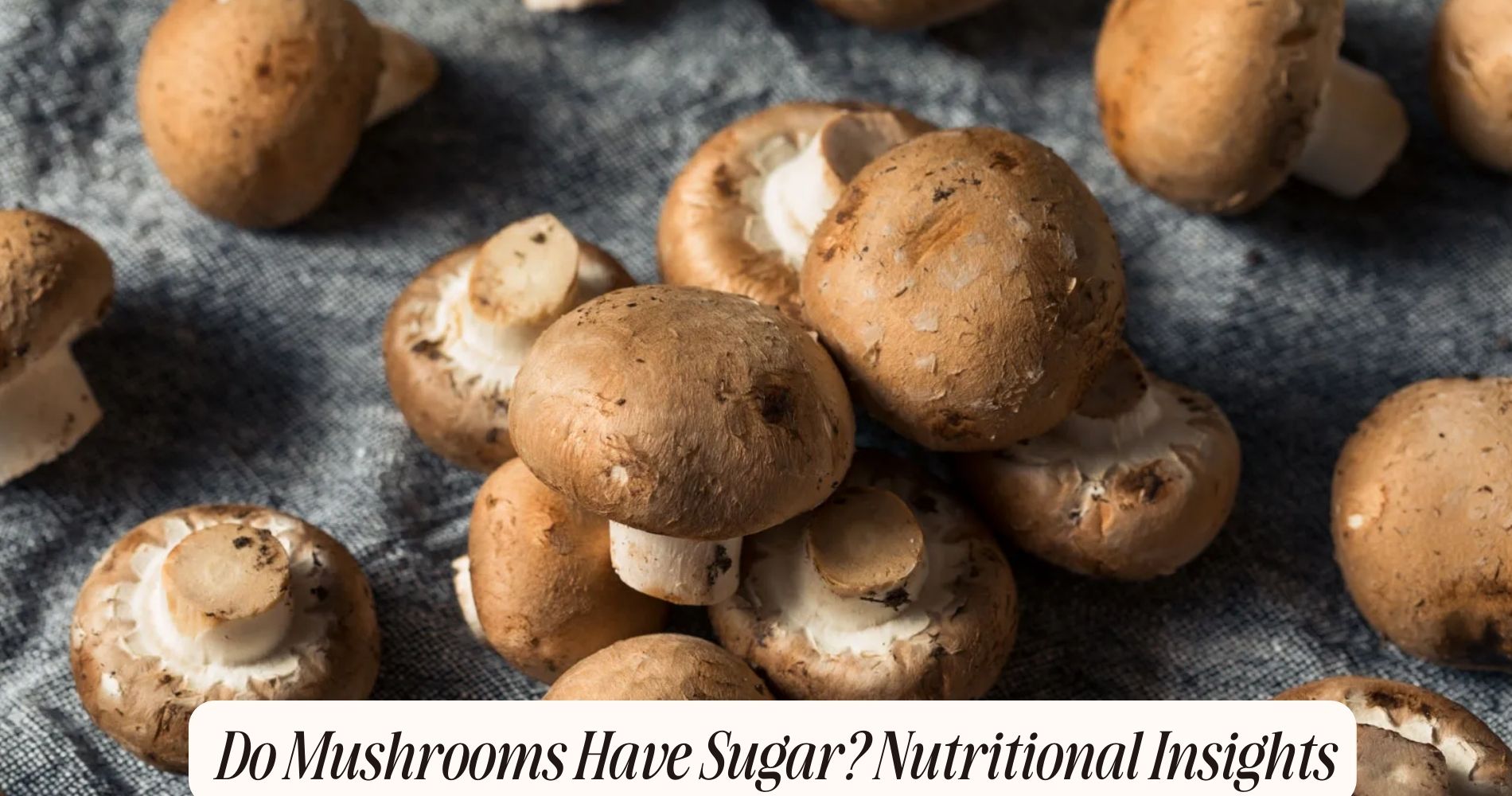
Do Mushrooms Have Sugar? Nutritional Insights
Do mushrooms have sugar? Yes, mushrooms contain a small amount of natural sugars, around 1.1 grams per cup of raw mushrooms, making them ideal for low-carb and low-sugar diets. They're low in calories, rich in B vitamins, selenium, and potassium, and offer dietary fiber that aids digestion. Natural sugars like mannitol and trehalose in mushrooms have a low glycemic impact, keeping blood sugar levels stable. Cooking can slightly alter sugar content, but mushrooms remain nutrient-dense and a great addition to manage blood sugar and support overall health. Want to explore their full nutritional benefits? There's more to uncover.
Understanding Mushroom Composition
To truly understand the benefits mushrooms offer, it's essential to explore their unique composition, which includes a variety of vitamins, minerals, and bioactive compounds. Different mushroom varieties, cultivated through various methods, contribute distinct nutritional profiles. For instance, mushrooms like shiitake, oyster, and maitake are rich in B vitamins, such as riboflavin, niacin, and pantothenic acid, which are necessary for energy production and neurological function.

Mushroom cultivation methods greatly affect their nutrient content. For example, mushrooms grown on enriched substrates may contain higher levels of minerals like selenium, potassium, and copper. These minerals play critical roles in antioxidant defense, cardiovascular health, and immune function. Additionally, mushrooms are a good source of dietary fiber, particularly beta-glucans, which have been shown to support heart health and improve blood sugar regulation.
Bioactive compounds in mushrooms, such as ergothioneine and polysaccharides, contribute to their anti-inflammatory and immune-boosting properties. Understanding these components helps you appreciate the health benefits of incorporating mushrooms into your diet. By selecting a variety of mushrooms and paying attention to their cultivation methods, you can maximize their nutritional advantages and support overall well-being.
Types of Edible Mushrooms
Among the myriad types of edible mushrooms, each variety offers unique flavors and health benefits, making them a versatile and nutritious addition to your diet. You can explore a range of wild mushroom varieties such as chanterelles, morels, and porcini, each bringing distinct taste profiles.
Chanterelles, with their peppery flavor, are rich in vitamins D and C. Morels are packed with antioxidants, while porcini mushrooms provide a robust, earthy taste and are high in protein.
Medicinal mushroom uses can't be overlooked either. Reishi mushrooms, known as the 'mushroom of immortality,' are often used for their immune-boosting properties. Shiitake mushrooms contain lentinan, a compound known to strengthen the immune system, and are also linked to heart health due to their ability to lower cholesterol levels.

Lion's mane mushrooms are gaining popularity for their potential to enhance cognitive function.
Incorporating these mushrooms into your diet can offer more than just culinary delights. Their diverse nutritional profiles and medicinal properties make them a valuable component of a health-focused diet.
Whether you opt for cultivated or wild mushroom varieties, you're adding a powerhouse of nutrients and potential health benefits to your meals.
Nutritional Profile
When you look at the nutritional profile of mushrooms, you'll find they're low in calories and rich in essential nutrients.
They provide a good balance of macronutrients like protein, fiber, and minimal fat, while also being packed with important micronutrients such as vitamins B and D, selenium, and potassium.
Understanding this breakdown can help you appreciate how mushrooms contribute to a balanced and healthy diet.
Macronutrient Breakdown
Mushrooms offer a unique macronutrient profile, providing a rich source of protein and fiber while being low in fat and calories. Different mushroom varieties, such as white button, shiitake, and portobello, all share this beneficial profile. For those seeking sugar alternatives, mushrooms can be particularly appealing due to their minimal carbohydrate content.
When you examine their macronutrient breakdown, you'll notice that mushrooms are impressively low in calories, typically containing around 15 calories per 100 grams. Their protein content, although modest, is significant for a vegetable, offering about 2-3 grams per 100 grams. This makes them an excellent addition to a protein-conscious diet.
Fiber is another standout component. A single serving can provide around 1-2 grams of dietary fiber, which aids in digestion and promotes a feeling of fullness. Additionally, mushrooms are virtually fat-free, making them ideal for those managing their fat intake.
Given their low sugar content, mushrooms can be a great addition to diets requiring sugar alternatives. They provide essential nutrients without the added sugars found in many other foods, making them a smart choice for maintaining balanced blood sugar levels.
Micronutrient Composition
You'll find that mushrooms are packed with essential micronutrients, offering significant amounts of vitamins like B-complex vitamins and minerals such as selenium and potassium. These nutrients play important roles in maintaining your overall health.
For instance, B-complex vitamins, including riboflavin, niacin, and pantothenic acid, support energy metabolism, ensuring your body efficiently converts food into energy.
Mushrooms also boast impressive mineral content. Selenium, found in substantial quantities in many mushroom varieties, acts as a powerful antioxidant, helping protect your cells from damage. Potassium, another key mineral, contributes to maintaining proper muscle function and regulating blood pressure.

The micronutrient diversity in mushrooms doesn't stop there. They also contain trace amounts of other essential minerals like copper, which aids in iron absorption and red blood cell formation, and zinc, crucial for immune function and wound healing. Additionally, mushrooms provide some vitamin D, especially when exposed to sunlight, contributing to bone health by enhancing calcium absorption.
Incorporating mushrooms into your diet offers a broad spectrum of micronutrients that support various bodily functions. Their rich vitamin and mineral content makes them a smart choice for bolstering your nutritional intake.
Carbohydrate Content
Most mushrooms contain a low amount of carbohydrates, making them a suitable addition to a low-carb diet. Different mushroom varieties like white button, portobello, shiitake, and cremini have slightly varying carbohydrate content, but they generally remain within a low range. For instance, a cup of sliced white mushrooms contains roughly 2.3 grams of carbohydrates, while the same amount of portobello mushrooms has about 3.9 grams. These amounts are minimal compared to other carbohydrate sources such as grains, starchy vegetables, and legumes.
When you include mushrooms in your diet, you're leveraging their nutrient density without greatly increasing your carb intake. This is particularly beneficial if you're managing conditions like diabetes or following a ketogenic diet. Mushrooms also provide dietary fiber, which is essential for maintaining a healthy digestive system. Fiber, a type of carbohydrate that your body can't fully digest, doesn't spike blood sugar levels and aids in satiety.
It's important to examine the overall nutritional profile of mushrooms. They offer a unique blend of vitamins, minerals, and antioxidants, making them not only a low-carb option but also a nutritionally rich food that supports overall health.
Natural Sugars in Mushrooms
Despite their savory flavor profile, mushrooms contain small amounts of natural sugars that contribute to their overall carbohydrate content. These sugars, primarily mannitol and trehalose, play an essential role in the mushroom sweetness you might occasionally notice. Mannitol, a sugar alcohol, is known for its low glycemic impact, making it a suitable choice for those monitoring their sugar intake. Trehalose, another natural sugar, helps mushrooms maintain their cellular integrity, especially under stress conditions like dehydration or freezing.
When you consume mushrooms, these natural sugars are metabolized in your body. Mannitol, due to its sugar alcohol structure, is absorbed more slowly than other sugars, leading to a gradual impact on your blood sugar levels. Trehalose, on the other hand, is broken down by the enzyme trehalase in your small intestine, releasing glucose for energy. This process of sugar metabolism guarantees that mushrooms provide a steady, albeit modest, source of energy without causing significant spikes in blood sugar.

Understanding the natural sugars in mushrooms can help you appreciate their nutritional complexity. While they aren't sweet like fruits, the presence of mannitol and trehalose adds to their subtle mushroom sweetness and contributes to their health benefits.
Glycemic Index
Understanding the role of mannitol and trehalose in mushrooms leads us to contemplate their impact on the glycemic index, a measure of how quickly foods raise blood glucose levels. Mannitol and trehalose are types of sugars found in mushrooms, but they have unique properties that influence sugar metabolism differently compared to common sugars like glucose and fructose.
Mannitol, a sugar alcohol, is absorbed slowly in the digestive tract, resulting in a minimal glycemic response. Trehalose, a disaccharide, breaks down into two glucose molecules, yet its digestion and absorption are gradual, which also leads to a lower glycemic impact. This slow absorption process means mushrooms have a low glycemic index, making them a favorable option for maintaining stable blood sugar levels.
When you eat mushrooms, the gradual breakdown and absorption of their sugars help to avoid spikes in blood glucose. This is particularly important for managing conditions like diabetes, where controlling blood sugar levels is vital. Incorporating mushrooms into your diet can support balanced sugar metabolism, providing a steady energy source without causing significant fluctuations in blood glucose.
Health Benefits
Incorporating mushrooms into your diet offers numerous health benefits, ranging from immune system support to potential anticancer properties. Different mushroom varieties, such as shiitake, maitake, and reishi, are rich in bioactive compounds like beta-glucans, which enhance your immune response and help fight off infections. These compounds can increase the production and activity of white blood cells, making your body more adept at combating pathogens.

Mushrooms are also packed with antioxidants, specifically ergothioneine and selenium, which protect your cells from oxidative stress. This may reduce the risk of chronic diseases, including heart disease and cancer. Additionally, some studies suggest that mushrooms have anti-inflammatory properties, which can aid in managing conditions like arthritis.
Certain mushroom varieties, like lion's mane, are known to support cognitive function. Research shows that they may promote nerve growth and protect against neurodegenerative diseases. Moreover, mushrooms are a good source of vitamins and minerals such as vitamin D, B-vitamins, and potassium, which are essential for maintaining overall health.
Mushrooms in Low-Sugar Diets
Given their numerous health benefits, mushrooms are also a valuable addition to low-sugar diets due to their low glycemic index and high nutrient density. When you're looking to manage your sugar intake, incorporating various mushroom varieties like shiitake, portobello, and cremini can be a game changer. These mushrooms contain minimal natural sugars, making them an ideal choice for low sugar recipes.
You'll find that mushrooms are rich in essential nutrients like B vitamins, selenium, and potassium, which support overall health without spiking your blood sugar levels. Their fiber content also aids in digestion and helps maintain a feeling of fullness, making them a smart choice for those aiming to control their appetite and manage weight.
Including mushrooms in your diet is straightforward. You can sauté them with olive oil and garlic for a simple, low-sugar side dish, or add them to salads, soups, and stir-fries. Their versatile flavor profile complements many low sugar recipes, allowing you to enjoy varied and delicious meals without compromising your dietary goals.
Frequently Asked Questions
Can Mushrooms Cause Allergic Reactions?
Yes, mushrooms can cause allergic reactions. If you're allergic, you might experience allergic symptoms like itching, swelling, or respiratory issues. Mushroom allergies are rare but should be taken seriously to avoid severe health complications.
Are Mushrooms Safe to Eat Raw?
You can eat raw mushrooms safely, enjoying raw mushroom benefits like antioxidants and vitamins. Incorporate them into raw mushroom recipes for a nutritious boost. However, make certain they're thoroughly cleaned to avoid any potential contaminants.
How Should Mushrooms Be Stored to Maintain Freshness?
To maintain ideal storage and guarantee freshness, keep mushrooms in a paper bag in the refrigerator. Avoid plastic bags, as they trap moisture and cause spoilage. Following these freshness tips, you'll enjoy healthier, longer-lasting mushrooms.
Do Mushrooms Contain Any Fat?
Yes, mushrooms contain very minimal fat. Their low mushroom fat content makes them an excellent addition to your diet, providing numerous health benefits like boosting immunity and offering essential nutrients without adding unhealthy fats.
What Are the Environmental Impacts of Mushroom Farming?
Mushroom farming uses sustainable practices that improve soil health. You'll find that mushrooms require minimal water and energy, reducing the environmental footprint. Their cultivation also helps recycle agricultural waste, contributing positively to the ecosystem.
Conclusion
In conclusion, mushrooms offer a nutritious profile with minimal natural sugars, making them an excellent choice for low-sugar diets.
Their carbohydrate content is primarily fiber, which aids digestion and supports overall health.
When compared to other vegetables, mushrooms stand out for their unique benefits without spiking sugar levels.
By incorporating mushrooms into your meals, you're making a health-conscious decision that's both flavorful and beneficial for maintaining balanced blood sugar levels.




